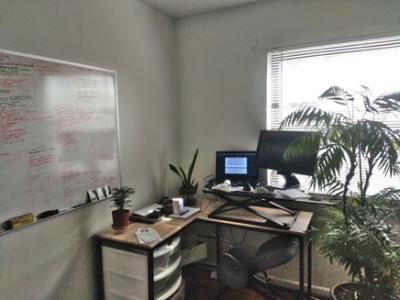Telecommunication is a legitimate way to work

Written by TPS PhD candidate Zach Konkel
COVID-19 has transformed the world in myriad ways. I owe empathy and respect to the people I do and don’t see affected by the disease. Perhaps in a positive light, COVID has catalyzed the inevitable legitimization of telecommunication. What was once primarily restricted to luxurious, new-age tech jobs with plush “idea rooms” has forcefully been cast upon almost every industry. It’s a brave new world, and herein I describe my quality of life and how I navigate telecommunication.
Telecommunication was (is?) often scoffed at – an excuse to go home and sloth. I cannot completely fault that perception as I have direct experience with that employee prior to graduate school. But every one of my previous jobs had employees that cast bricks upon my team’s back because they slacked – at home or not. Everyone sometimes underperforms – at home or not. Perhaps sloth days are more pronounced when the micromanager can only breathe down shoulders on Zoom. But should recess (telecommunication) be taken from the whole class because of one kid? Should a company evaluate financial success over employee satisfaction? Are they mutually exclusive?
I argue telecommunication will improve employee quality of life if it is negotiated to the appropriate extent to balance job duties and employee desires. These days I feel incredibly fortunate to work from home: I do not stress if I have enough leftovers for work – I can whip up a smoothie here; forgot to do my laundry – my robe is my suit; and I don’t sacrifice sanity to the screaming “Get up to commute, you delinquent” alarm – the God-given nuclear furnace is my alarm. My meetings are clicks away from being on time. I have a nice desk these days, a corner of the room I can call my own private office… and there is a window that satisfies my necessity for vitamin D. Sure, I miss the animalistic satisfaction only attainable in physical proximity to others, but I’m not arguing 100% telecommunication. I am grateful for and miss aspects of my situation prior to COVID – the situation was not bad by any means, it was normal, but perhaps COVID is right that normal ought to change. Perhaps it can be American to wear masks during flu season and focus on quality of life at home.
At first, working from home was difficult – I picked up a $5 desk from Volunteers of America and had to squeeze my shoulders in all day to get work done. My desk was next to my bed. The extraneurological sphere of work loomed over me when I slumbered and manifested in the squeek of my grinding teeth. The first step I took toward success was moving that desk somewhere else and making sleep sacred. Though that helped move work from my bedroom to my “office”, the work aura persisted throughout the house. Constantly thinking about work: what to do, what have I not done, who have I let down, what did I forget? I acquired a whiteboard and hung it next to my desk. Now the myriad ideas are cemented, and out of my head. I still think about work too much, but the anxiety significantly decreased. Next, I developed a tentative schedule: 9-5, and if I fail to adequately meet that schedule, I can compensate later on instead of wasting a commute. My first publication came from telecommuting, my PhD qualifying exams, 3 fellowship/grant applications, a suite of python tools that have become focal to my dissertation, 3 collaborations – 1 international. My productivity increases when my body is the foremost concern and telecommunication allows me to more easily give it that precedence – I do not have to meticulously plan my meals and household chores on top of my work schedule, I can work with them together. I purchased an ergonomic keyboard, a legitimate desk, and a standing desk conversion apparatus that allows me to switch positions and prioritize my body. My breaks include workouts, musical sessions, and maybe a power nap. When I worked at McDonald’s, my breaks were in my car with a leaking roof and the seat soaked in my greasy gear crisping in the sun.

Isn’t it crazy that my overall productivity and quality of my work is a function of how well I take care of myself and that I can better take care of myself when I’m in charge of my work environment? My work improves with my quality of life. And my quality of life improves when I can work from home. My week doesn’t directly revolve around work as much and my weekends don’t indirectly revolve around compensating for time lost from work. My cat gets the contact he, as a living, breathing being on the same plane as me, deserves. Now, I must say, my boss treated me as legitimate when I telecommuted prior to COVID (which is extraordinary), but I still shied away from it because I worried telecommunication was illegitimate in the broader community. Moving forward, I hope that stigma will dissolve and bring the opportunity to every possible industry.
